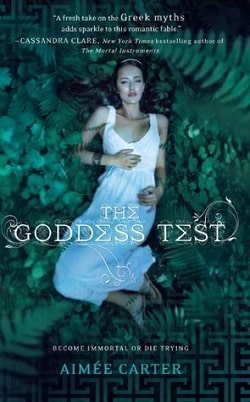Aimee Carter's The Goddess Test is a captivating blend of mythology, romance, and the trials of adolescence, set against the backdrop of a modern-day retelling of the ancient Greek myth of Persephone and Hades. The story follows Kate, a teenage girl grappling with the impending loss of her mother, who is battling a terminal illness. This emotional weight serves as the catalyst for the narrative, propelling Kate into a world where the stakes are not just about passing tests but also about life, death, and the bonds of love.
From the outset, Carter establishes a poignant atmosphere, as Kate's life is overshadowed by her mother's deteriorating health. The author skillfully portrays Kate's internal struggles, her feelings of isolation, and the burden of responsibility she carries. This emotional depth is one of the book's strongest aspects, as it allows readers to connect with Kate on a personal level. The transition to a new school, compounded by her mother's illness, sets the stage for a story that is as much about personal growth as it is about supernatural challenges.
When Kate meets Henry, who claims to be Hades, the narrative takes a thrilling turn. Henry is depicted as a dark and tortured figure, embodying the complexities of love and sacrifice. His character is intriguing, as he oscillates between being a brooding romantic interest and a powerful god with a heavy burden. Carter's portrayal of Henry is nuanced; he is not merely a love interest but a character with his own struggles and motivations. This complexity adds depth to their relationship, making it more than just a typical teenage romance.
The premise of the tests that Kate must undertake to save her mother is both engaging and suspenseful. Each test serves as a metaphor for the challenges of growing up and the sacrifices one must make for love. The stakes are high, and the tension builds as Kate navigates these trials, each one revealing more about her character and her determination. Carter's writing shines in these moments, as she balances the fantastical elements of the story with the very real emotional stakes that Kate faces.
One of the central themes of The Goddess Test is the exploration of love in its various forms—romantic love, familial love, and self-love. Kate's relationship with her mother is particularly poignant, highlighting the lengths one will go to for family. This theme resonates deeply, especially for readers who have experienced the pain of losing a loved one. The bond between Kate and her mother is beautifully depicted, serving as a reminder of the fragility of life and the importance of cherishing those we hold dear.
Moreover, the book delves into the theme of identity and self-discovery. As Kate faces the tests, she learns more about herself, her strengths, and her weaknesses. This journey of self-discovery is relatable for many young adults, making Kate a compelling protagonist. Her evolution from a girl burdened by fear and uncertainty to a strong, determined individual is inspiring and serves as a powerful message about resilience and courage.
Carter's writing style is accessible and engaging, making the book a page-turner. The dialogue flows naturally, and the pacing is well-balanced, allowing for moments of tension and introspection. The world-building is also commendable; Carter weaves elements of Greek mythology seamlessly into the narrative, enriching the story without overwhelming the reader. The inclusion of mythological figures and the reinterpretation of their stories adds a layer of depth that fans of mythology will appreciate.
However, while The Goddess Test excels in character development and emotional resonance, some readers may find certain plot points predictable, especially those familiar with the myth of Persephone. The love story, while compelling, follows a familiar trajectory that may not surprise seasoned readers of the genre. Nonetheless, Carter's unique voice and the emotional stakes involved elevate the narrative beyond mere predictability.
In comparison to other young adult novels that explore themes of love and sacrifice, such as The Mortal Instruments series by Cassandra Clare or Fallen by Lauren Kate, The Goddess Test stands out for its rich emotional core and its focus on the mother-daughter relationship. While Clare and Kate delve into darker themes of power and destiny, Carter's narrative is more grounded in personal struggle and the bonds of family, making it a refreshing addition to the genre.
Overall, The Goddess Test is a beautifully crafted tale that combines elements of mythology with the trials of adolescence. Aimee Carter has created a world that is both enchanting and relatable, filled with characters that resonate with readers. The emotional depth of the story, coupled with the suspense of the tests, makes for a compelling read that will linger in the minds of its audience long after the last page is turned. For those seeking a story that explores love, sacrifice, and self-discovery, The Goddess Test is a must-read.







![I Don't Feel Like Doing Anything [ Official ]](/upload/pic/manga/i-dont-feel-like-doing-anything---official--.jpg)
















Reviews 0
Post a Reviews: